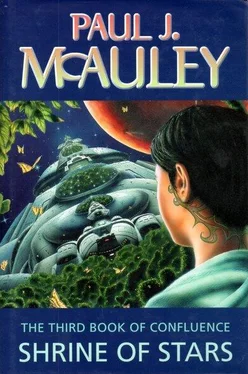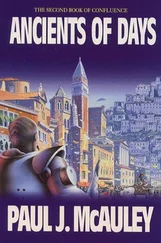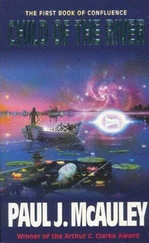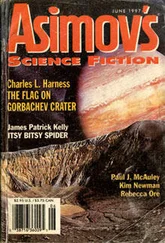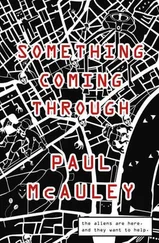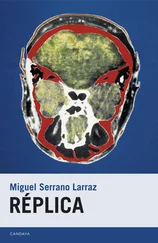It was a frail hope. For even if he found Pandaras, what could he tell him? And if Pandaras found him, what could he do?
A frail hope, yes, but all the hope he had.
It had once been the most beautiful city on Confluence, prosperous and peaceful, its network of canals perfumed by water-lilies and lined by palms and flowering trees, its houses white as salt, with green gardens tumbling from their terraces, its main temple renowned for the wisdom of its avatar. Three bloodlines had lived there in harmony. It had been famous for its metalworkers, jewelers and weavers, and for the seminary where half the priests on the world were trained.
The war had transformed it. The population had been swollen to ten times its original size by soldiers and their followers, and by refugees who crowded the streets and made their encampments in the parklands and groves of citrus trees around the city. Fliers hung at the upriver edge of the city, some bigger than the carracks which disgorged a thousand soldiers at a time. The docks were clogged with carracks and other ships, the quays piled with supplies. The park around the great temple had been turned into a barracks. Illicit stalls flourished, supplying hundreds of fly-by-night bars. There were firefights between gangs dealing in drugs and prostitution, and between the gangs and the civil guards who tried to contain them. Dead bodies lay unclaimed by the sides of the busy streets, picked over by dholes and kit foxes, or floated amongst the flowering lilies in the wide canals, each attended by a retinue of green turtles and one or two pensive turkey vultures. There were rumors of heretic cults infiltrating the city; soon after they arrived, Pandaras and Tibor saw a woman run into a café which, a moment later, exploded in a ball of orange flame from which two or three burning figures staggered to collapse on the pavement.
Day and night the streets were full of soldiers and all those who fed off them: prostitutes of a hundred different bloodlines, hawkers, gamblers, grifters, gandy men, charlatans selling false blessings or fake charms or shirts guaranteed to repel the weapons of the heretics. Streams of wagons, rickshaws and tok-toks, the motorized bicycles particular to Ophir, wound through crowded streets noisy with the cries of hawkers and hordes of beggars, with music from bars and roadside food stalls, with bells and whistles and horns from the unceasing flow of traffic, with the roar of illegal generators. The canals were clogged with slow-moving boats, and at every intersection sampans were tied together to form impromptu water markets. At night, neon signs buzzed and flickered and cast colored shadows over the white walls of the buildings, and the noise and the crowds seemed to double and redouble, a restless unsleeping flood of people.
Pandaras sold the reaction motor and arbalest on the first day of their arrival, but he got very little for them; the city was glutted with weapons and equipment. He took up singing in the pavement cafés, performing two or three standard airs at each while Tibor collected a few small coins from the customers. When Tibor complained bitterly at this indignity, Pandaras pointed to the small girl who was moving from table to table and asking the customers if they wanted their boots cleaned, and then to her brothers, working by the door with cloths and polish, and said that there were worse ways of earning a living.
“I am a hierodule, little master,” Tibor said, with an air of wounded dignity. “I am not some street urchin. This is beneath me.”
“You are mine to command. You said so yourself. Your people allow themselves to be commanded by others as atonement for the sins of their ancestors. You make yourselves slaves, and so you make those around you slaves too, because they must take responsibility for you. How easy it must be to have others make all your decisions for you! How easy it is to be like a child! Well, now you must suffer the consequences. You cannot choose how you will serve. You must do as you are told. And you will do as I tell you, because we need money to buy passage downriver. Perhaps you do not understand that because you are a slave, and slaves have no need of money because their owners look after them. But we need money now if we are to find my master before I grow old. My bloodline burns brightly and briefly. I have no patience for the safe but slow way of doing things.”
“We will find the Weazel ,” Tibor said. “Then all will be well. You will see. They think us dead, but they will be so happy to see us again.”
“They are dead! They are dead and destroyed and the ship is destroyed. Phalerus survived a little while because he was farther away from the center of the fire, but it would have been better for him if he had died at once, like the others. And that is what happened. Everyone but Phalerus was killed in one instant, and burned up into smoke in the next. They were killed by a weapon of war. You must understand that, Tibor. You must.”
“You could sell the book,” Tibor said, after a long silence.
Pandaras sighed. It was impossible to knock any sense into the hierodule’s round, hairless head. He said, “It is not mine to sell. It is my master’s, and I have sworn to return it to him.”
“Perhaps the Weazel will arrive soon,” Tibor said. “We have surely overtaken it, little master, but it will catch up with us by and by and put in at the docks. Everything that goes downriver to the war stops at Ophir.”
“We cannot stay here,” Pandaras said. “We must find my master.” The tiny spark in the coin had multiplied into a pattern of dots and dashes of light that was different every time Pandaras looked at it. They were nearer to Yama now, he thought, but not yet close.
For the first few nights Pandaras and Tibor lived on the streets, washing and drinking at the public standpipes, sleeping on a roof amongst clattering windmill generators in a nest of bubblewrap and plastic-foam packing bought from a scavenger. Everything in the city had its price. Weapons, armor and ammunition were cheap, but food and accommodation were ludicrously expensive, for this was a war economy.
Ophir was a long way from the war front in the fringe jungles of the Marsh of the Lost Waters, but on their third night in the city, Pandaras and Tibor were woken by a faint continuous thunder and flashes of blue light far downriver. It seemed to have woken the whole city, for people stood on every roof, watching the fugitive flashes. Suddenly a thread of white light split the black sky from top to bottom and for a moment it was everywhere as bright as day. The light winked out even as Pandaras raised his hands to shield his eyes, and several heartbeats later there was a long low rumble and the roof on which he and Tibor stood rolled like the deck of a ship. The palms that lined the street below doffed their heads, and all over the city bats and birds and big dragonflies took wing.
Once Pandaras had amassed enough money for a deposit, he rented a sleeping place in a house beside one of the canals. It was a subdivision of what had once been a graciously proportioned room, screened by paper stretched over bamboo frames, with barely enough space for a pair of raffia sleeping mats. Two families lived in the other parts of the room. One, of a quick, lithe, brown-skinned black-haired bloodline, ran a food stall, and the smell of hot oil and steamed vegetables always hung heavy in the air. Tibor helped them out, at first chopping vegetables, then graduating to making the sweet shrimp sauce and thin loaves which were served with every dish. The other family, five generations, from tiny hairless kit to toothless grandfather, lived on the income from three rickshaws. It was always noisy, for someone was always awake in one or another of the room’s subdivisions, mending one of the rickshaws or cooking, squabbling or playing cards or listening to a cassette of prayers, and all around was the mingled sound of hundreds of other lives lived in public.
Читать дальше
